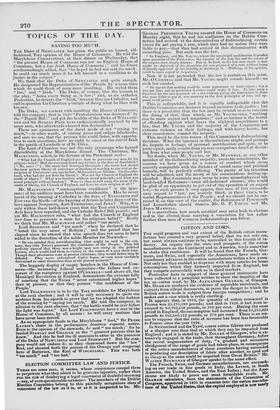ELECTION COMMITTEE LAW AND JUSTICE.
THERE are some men, it seems, whose consciences compel them to perpetrate what they admit to be grievous injustice, rather than run the risk of disobeying a legal enactment of doubtful meaning —nay, of even questionable existence. The members of the Dublin Election Committee belong to this painfully scrupulous class of venerators of the law as it is, or as it is suspected to be. Mr. GEORGE FREDERICK YOUNG assured the House of Commons OH Monday night, that he and his coadjutors on the Dublin Com- mittee had 'arrived at the determination of disfranchising certain voters for raot paying a rate, which they had no notion they were liable to pay,—that they had arrived at this determination with exceeding pain. But such was the law.
"In England, said Mr. Youwc, where the municipal qualification depended upon payment of the Poor-rates, the amount of the sum due and the nature of the impost were clearly known. But in Ireland, as the law now stood, a man might be deprived of his franchise for non-payment of a rate without being distinctly apprized of his liability to discharge it. Nothing, in his opiniote, could be niore unjust or iniquitous. '
Now it is not pretended that the law is certain on this point. Mr. O'CosneeLe said that Mr. YOUNG might console himself—no such law existed.
" He agreed that nothing could be more monstrous or more unjust; but it was not law, and no particular decision could make it law. To take away a franchise for the nom-payment of a tax without giving the least notice to those who were liable to pay it, was contrary to the first principles of law, and op- posed to all justice.
This is indisputable, and it is equally indisputable that the Dublin Ccmmittee are desirous beyond :measure to do justice ; but there is a possibility that the law may be twisted so as to sanction the doing of that, than which, as Mr. YOUNG says, " nothing can be more unjust and iniquitous ;" and so intense is the horror of offending against what bears the slightest resemblance to a law, that Mr. YOUNG and the majority of the Committee put extreme violence on their feelings, and with heavy hearts, but clear consciences, commit the iniquity.
This must be the true reason of the Committee's disfranchising decisions. What the ignorant or the malicious might, and perhaps do, impute to feelings of personal mortification and spite, or to party-spirit, really results from an over-scrupulous dread of deviat- ing from what some people call law.
No doubt, when Mr. YOUNG, or Mr. MAXWELL, or any other member of the disfranchising majority, meets his constituents, the reasons we have given for a course of conduct which seems scarcely compatible with the dictates of sound sense and political honesty, will be perfectly sufficing. The purity of his intention will be admitted, and the nicety of his conscientious feeling ap- plauded. But it certainly may occur to some unmetaphysical but hard-headed Reformers—some old-fashioned electors, who would be glad of an opportunity to get rid of the operation of an unjust law,—to such persons it may appear, that men of this extraordi- nary regard to "law," are scarcely fitted, in these times, to be useful Representatives of the People ; and we should not be sur- prised if, on this view of the matter, the Reformers of Tynemouth and Lanarkshire should dismiss Mr. G. F. YOUNG and Mr. JOHN MAXWELL.
It is marvellous how much mischief may arise both to electors and to the elected; from carrying a veneration for law rather further than men of common understandings can follow.


























 Previous page
Previous page